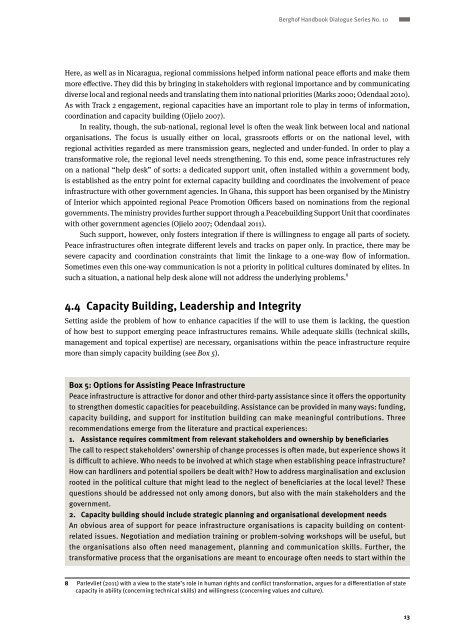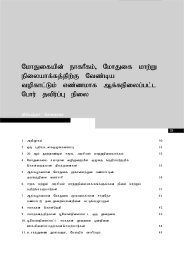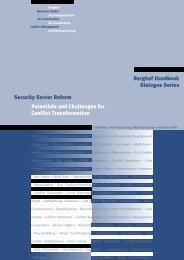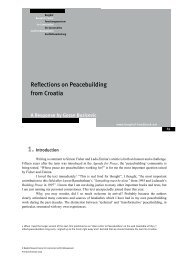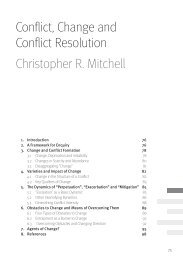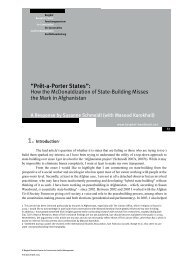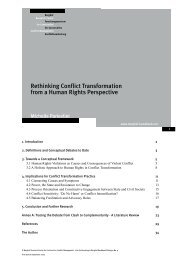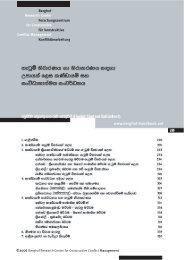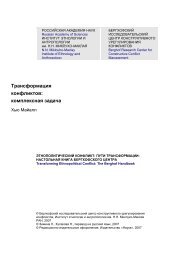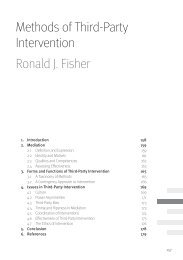Giving Peace an Address? - Berghof Handbook for Conflict ...
Giving Peace an Address? - Berghof Handbook for Conflict ...
Giving Peace an Address? - Berghof Handbook for Conflict ...
You also want an ePaper? Increase the reach of your titles
YUMPU automatically turns print PDFs into web optimized ePapers that Google loves.
<strong>Berghof</strong> H<strong>an</strong>dbook Dialogue Series No. 10<br />
Here, as well as in Nicaragua, regional commissions helped in<strong>for</strong>m national peace ef<strong>for</strong>ts <strong>an</strong>d make them<br />
more effective. They did this by bringing in stakeholders with regional import<strong>an</strong>ce <strong>an</strong>d by communicating<br />
diverse local <strong>an</strong>d regional needs <strong>an</strong>d tr<strong>an</strong>slating them into national priorities (Marks 2000; Odendaal 2010).<br />
As with Track 2 engagement, regional capacities have <strong>an</strong> import<strong>an</strong>t role to play in terms of in<strong>for</strong>mation,<br />
coordination <strong>an</strong>d capacity building (Ojielo 2007).<br />
In reality, though, the sub-national, regional level is often the weak link between local <strong>an</strong>d national<br />
org<strong>an</strong>isations. The focus is usually either on local, grassroots ef<strong>for</strong>ts or on the national level, with<br />
regional activities regarded as mere tr<strong>an</strong>smission gears, neglected <strong>an</strong>d under-funded. In order to play a<br />
tr<strong>an</strong>s<strong>for</strong>mative role, the regional level needs strengthening. To this end, some peace infrastructures rely<br />
on a national “help desk” of sorts: a dedicated support unit, often installed within a government body,<br />
is established as the entry point <strong>for</strong> external capacity building <strong>an</strong>d coordinates the involvement of peace<br />
infrastructure with other government agencies. In Gh<strong>an</strong>a, this support has been org<strong>an</strong>ised by the Ministry<br />
of Interior which appointed regional <strong>Peace</strong> Promotion Officers based on nominations from the regional<br />
governments. The ministry provides further support through a <strong>Peace</strong>building Support Unit that coordinates<br />
with other government agencies (Ojielo 2007; Odendaal 2011).<br />
Such support, however, only fosters integration if there is willingness to engage all parts of society.<br />
<strong>Peace</strong> infrastructures often integrate different levels <strong>an</strong>d tracks on paper only. In practice, there may be<br />
severe capacity <strong>an</strong>d coordination constraints that limit the linkage to a one-way flow of in<strong>for</strong>mation.<br />
Sometimes even this one-way communication is not a priority in political cultures dominated by elites. In<br />
such a situation, a national help desk alone will not address the underlying problems. 8<br />
4.4 Capacity Building, Leadership <strong>an</strong>d Integrity<br />
Setting aside the problem of how to enh<strong>an</strong>ce capacities if the will to use them is lacking, the question<br />
of how best to support emerging peace infrastructures remains. While adequate skills (technical skills,<br />
m<strong>an</strong>agement <strong>an</strong>d topical expertise) are necessary, org<strong>an</strong>isations within the peace infrastructure require<br />
more th<strong>an</strong> simply capacity building (see Box 5).<br />
Box 5: Options <strong>for</strong> Assisting <strong>Peace</strong> Infrastructure<br />
<strong>Peace</strong> infrastructure is attractive <strong>for</strong> donor <strong>an</strong>d other third-party assist<strong>an</strong>ce since it offers the opportunity<br />
to strengthen domestic capacities <strong>for</strong> peacebuilding. Assist<strong>an</strong>ce c<strong>an</strong> be provided in m<strong>an</strong>y ways: funding,<br />
capacity building, <strong>an</strong>d support <strong>for</strong> institution building c<strong>an</strong> make me<strong>an</strong>ingful contributions. Three<br />
recommendations emerge from the literature <strong>an</strong>d practical experiences:<br />
1. Assist<strong>an</strong>ce requires commitment from relev<strong>an</strong>t stakeholders <strong>an</strong>d ownership by beneficiaries<br />
The call to respect stakeholders’ ownership of ch<strong>an</strong>ge processes is often made, but experience shows it<br />
is difficult to achieve. Who needs to be involved at which stage when establishing peace infrastructure?<br />
How c<strong>an</strong> hardliners <strong>an</strong>d potential spoilers be dealt with? How to address marginalisation <strong>an</strong>d exclusion<br />
rooted in the political culture that might lead to the neglect of beneficiaries at the local level? These<br />
questions should be addressed not only among donors, but also with the main stakeholders <strong>an</strong>d the<br />
government.<br />
2. Capacity building should include strategic pl<strong>an</strong>ning <strong>an</strong>d org<strong>an</strong>isational development needs<br />
An obvious area of support <strong>for</strong> peace infrastructure org<strong>an</strong>isations is capacity building on contentrelated<br />
issues. Negotiation <strong>an</strong>d mediation training or problem-solving workshops will be useful, but<br />
the org<strong>an</strong>isations also often need m<strong>an</strong>agement, pl<strong>an</strong>ning <strong>an</strong>d communication skills. Further, the<br />
tr<strong>an</strong>s<strong>for</strong>mative process that the org<strong>an</strong>isations are me<strong>an</strong>t to encourage often needs to start within the<br />
8 Parlevliet (2011) with a view to the state’s role in hum<strong>an</strong> rights <strong>an</strong>d conflict tr<strong>an</strong>s<strong>for</strong>mation, argues <strong>for</strong> a differentiation of state<br />
capacity in ability (concerning technical skills) <strong>an</strong>d willingness (concerning values <strong>an</strong>d culture).<br />
13


